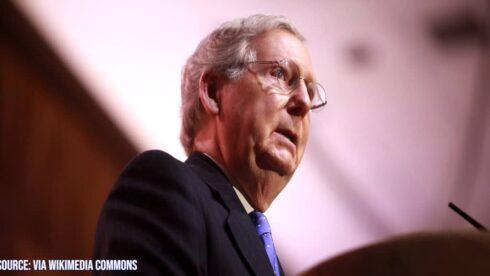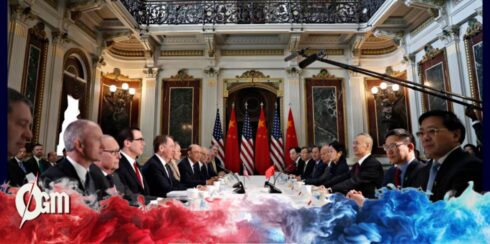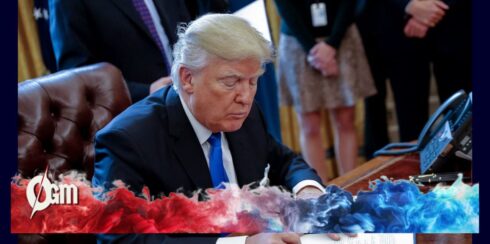Senate Minority Leader Mitch McConnell lashed out at two Democrat-appointed federal judges who reversed their decisions to retire after Donald Trump’s electoral victory in a heated speech on the Senate floor. Mitch McConnell accused the judges of engaging in a “partisan” maneuver designed to prevent a Republican president from appointing their successors. He claimed that these judicial moves were a calculated attempt to maintain a Democrat influence over the courts. The reversal of retirement plans came at a time when the balance of the judiciary could tip in favor of the GOP, causing Mitch McConnell to express frustration and concern.
Mitch McConnell’s accusations centered around what he perceived as an effort by the judges to ensure their replacement would not be a Trump-appointed conservative. “They rolled the dice that a Democrat could replace them and now that he won’t, they’re changing their plans to keep a Republican from doing it,” Mitch McConnell said, highlighting the political nature of these reversals. His comments underscore a growing partisan divide within the judiciary, a situation he believes undermines its integrity and impartiality.
Criticism of Judges for Retaining Seats Amidst Changing Political Landscape
The judges in question are U.S. District Judge Max Cogburn of North Carolina and U.S. District Judge Algenon Marbley of Ohio, both appointed by Democratic presidents. Cogburn, a Judge for the Western District of North Carolina, was initially set to retire but chose to remain on the bench after Trump’s victory. Marbley, serving for the Southern District of Ohio, had made similar retirement plans, but those were also reversed in light of the changing political dynamics. Both judges’ decisions have raised questions about their motivations and the timing of their reversals, leading Mitch McConnell to accuse them of playing a political game.
The decision of these judges to stay in their positions has sparked mixed reactions. Some see it as an assertion of judicial independence, while others view it as an overtly partisan act to preserve Democratic influence on the court. Mitch McConnell’s rhetoric condemns the judges for what he describes as “partisan behavior,” arguing that it reflects the political undercurrents shaping judicial decisions. This controversy has raised broader concerns about the politicization of the judiciary, especially as the country remains divided along partisan lines.
Mitch McConnell Denounces Judges for Undermining Judicial Integrity
Mitch McConnell’s speech on the Senate floor went further, as he decried the judges’ actions as a “brazen admission” of political maneuvering. He suggested that the incoming Biden administration should explore all possible legal avenues to ensure these judges recuse themselves from future cases. The minority leader’s comments painted the reversal of retirements as a clear attempt to influence the judicial system and tilt the balance in favor of the Democratic Party. Mitch McConnell’s tone conveyed his belief that such actions were detrimental to the credibility of the judicial branch.
“It’s hard to conclude this is anything other than open partisanship,” Mitch McConnell argued, as he condemned what he saw as a blatant disregard for the neutrality and independence that the judiciary should embody. He emphasized that the practice of holding onto seats for political gain threatened the core principle of impartial justice. Mitch McConnell’s remarks reflect a broader frustration within the Republican Party with what they view as an entrenched liberal bias in the judicial system.
Judicial Independence and Partisan Allegiances: A Delicate Balance
The controversy surrounding the reversal of the retirement decisions touches on a deeper issue—the delicate balance between judicial independence and partisan allegiances. Judges, especially those appointed by Democratic presidents, have often found themselves at the center of political debates, particularly during times of shifting power. While Mitch McConnell accuses these judges of partisanship, others argue that their decision to remain in office was simply a matter of personal choice, not political calculation. The debate highlights the ongoing tension between the need for an independent judiciary and the increasing influence of politics in judicial appointments.
Judicial independence is a cornerstone of the American legal system, but the growing involvement of partisan politics in judicial appointments and decisions has raised alarms. Mitch McConnell’s charges against the judges are not isolated; they reflect a broader narrative within the Republican Party that accuses Democrats of attempting to manipulate the courts to serve their political ends. While the reversal of retirements may appear to some as politically motivated, others defend the judges’ right to serve their terms as appointed officials without outside pressure.
Mitch McConnell’s Hypocrisy Draws Criticism Amid Judicial Debate
Mitch McConnell’s criticism of the federal judges for their perceived partisanship has drawn accusations of hypocrisy. His tenure as Senate Majority Leader saw him famously blocking President Obama’s Supreme Court nominee, Merrick Garland, arguing that a new president should make the appointment. His decision to refuse hearings for Garland was viewed as a highly partisan act, one that some argue set a precedent for political interference in judicial appointments. Mitch McConnell’s condemnation of the judges now, for engaging in what he calls partisanship, has led many to question his own commitment to judicial impartiality.
Critics point out that Mitch McConnell’s actions in blocking judicial appointments, particularly during the Obama administration, were just as politically motivated as the behavior he now condemns. His staunch refusal to allow hearings for Merrick Garland was seen as an attempt to preserve a conservative majority on the Supreme Court, an action that many argue was as partisan as the moves he now criticizes. This apparent double standard has fueled accusations that Mitch McConnell is more focused on advancing Republican power than on protecting the integrity of the judicial system.
The Broader Implications for the Judiciary and American Politics
The ongoing battle over judicial appointments is just one piece of a larger political struggle that has become central to American governance. As McConnell’s comments suggest, the future of the judiciary is now seen as one of the most significant fronts in the fight between the two major political parties. With each new presidential administration, the ability to appoint or block judges has become a powerful tool for shaping the ideological makeup of the courts. Mitch McConnell’s outburst underscores how much the political landscape now hinges on the judicial system, with both sides seeking to influence decisions that could have far-reaching consequences.
As the Biden administration prepares to assume power, the question of how to handle judicial nominations remains crucial. Mitch McConnell’s statement that the incoming administration should explore recusal options for judges like Cogburn and Marbley highlights the deepening partisan divide in the judicial branch. This controversy is not just about two judges’ retirements; it is a symbol of the broader challenges facing the judiciary as it becomes more entwined with partisan politics. The future of judicial appointments will likely continue to be a contentious issue, one that will shape American politics for years to come.














